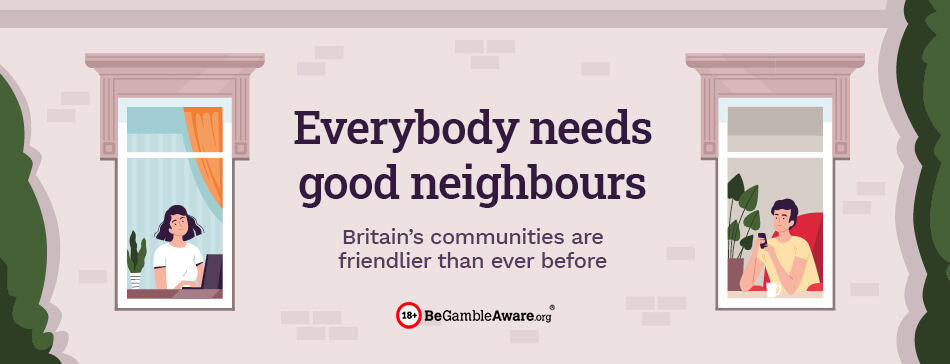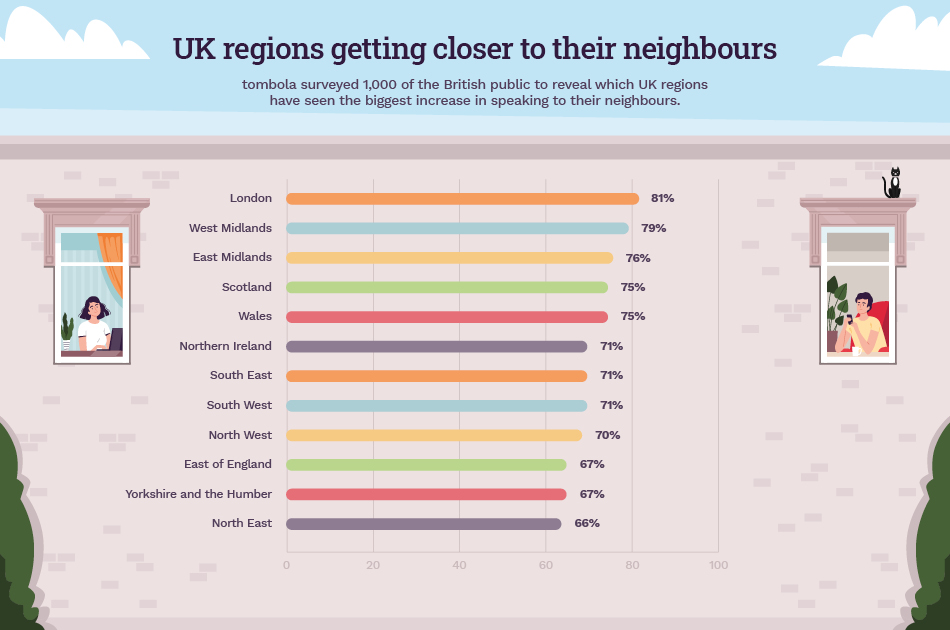
Everybody needs good neighbours: Britain’s communities are friendlier than ever before
With people spending more time in their homes than ever before, our neighbours have, for some, become the only means of socialising.
Before COVID-19, Brits had been spending increasingly less time with their neighbours, with over three quarters (73%) not knowing the names of those who lived next door. However, new research from tombola shows Britain’s communities are closer than ever, with local lockdowns seeing many turn towards the people living closest to them for help.
To celebrate the rising community spirit in Britain, tombola surveyed 1,000 Brits to reveal how the pandemic has made us closer to our neighbours and, of course, which region in the UK is the friendliest.
74% of Brits said they are closer to their neighbours now, more than ever before

In 2018, 68% of Brits described their neighbours as ‘strangers’. Fast forward to 2020, and 74% of Brits surveyed said they are closer than ever to their neighbours due to the pandemic, suggesting where we live has never been more important.
There’s something reassuring about enjoying a close relationship with those living next door. They’re the people closest to you in an emergency, if you run out of anything or even just need to see a friendly face - and we are seeing our communities become closer due to these reasons.
This year, almost half (49.2%) of the UK’s workforce has worked from home, meaning people have had to rely on their neighbours even if they were strangers previously.
1 in 6 (18%) have spoken to their neighbours for the first time this year
Previously, 73% of Brits had said they didn’t know the names of their neighbours. But, during the pandemic, 1 in 6 (18%) have said that they have spoken to those living nearby for the first time. This could be due to many being unable to leave their home and needing to rely on the people who are physically closest to them due to not being able to socialise much with family or friends.
A quarter of young people are speaking to their neighbours for the first time ever
Surprisingly, it’s those aged between 18-24 that have seen the biggest increase in people speaking to neighbours for the first time. Typically, it’s younger people that rent, which can mean that communities don’t have time to grow where people are moving regularly. However, tombola’s research suggests that these communities are being reawakened, and we are seeing neighbourly relationships go from strength to strength.
16% said their neighbours are helping each other out to get through the pandemic
While many have struggled during the pandemic, we can see that Britain’s communities are stronger than ever. 16% of Brits surveyed said that they and their neighbours now help each other out more, whether that be with shopping or other essentials.
tombola also analysed the age groups for those who have been helping each other out the most, and found that the highest number was those aged between 55 and 65. 19% of people surveyed in those age groups have found neighbours are helping each other out with shopping etc., compared to 15% of those between 18-54.
However, we can see that across the board, neighbours are indeed becoming good friends for many.
13% now speak to their neighbours everyday due to the pandemic
From not speaking before the pandemic, a staggering 13% now speak to their neighbours every day, with friendships continuing to build as we spend less time socialising elsewhere due to restrictions and more time together at home.
A further 1 in 10 said they speak to those living nearby every other day, with 18% saying that their communication with their neighbours has increased to weekly conversations.
Danielle Pegg Mowbray, 40, from Newcastle Upon Tyne said: “When everyone started celebrating the NHS and putting pictures of rainbows in their windows, my husband, who is an artist, decided to paint the entire bedroom window upstairs. Every couple of weeks he did a new painting, using acrylics on the glass. He painted messages of hope and support. At night, they were backlit from the room so they could be seen in the light or the dark. He also made videos of the process which he shared on social media.
These paintings became a talking point for some of our neighbours in the street, who would mention how much they enjoyed them and they helped to start conversations with some neighbours we hadn’t really spoken to before and who we now speak to every time we see them.”
Natalie Avery from Brighton also had a similar experience to Danielle, saying: “During lockdown, I've really connected with neighbours, one lot because they are kind and supportive and there's also a WhatsApp group for my street which is great for mutual aid. People are using it to help others, offer items (from furniture, to toys, to food) and get help and advice. There's also a mutual aid Facebook group for the local area, and our local shop offers free meals to key workers as they also have a catering business.”
London has seen the biggest increase in people becoming closer to their neighbours

In London, renters now outnumber homeowners, with, previously, 1 in 10 Londoners admitting they couldn’t identify their neighbours in a line-up. Today, however, it appears the capital is becoming a friendlier place, with 81% of people surveyed in the city stating their relationships with their neighbours have improved due to the pandemic.
24% of Londoners said they have spoken to those living next door for the first time over the past several months, which could be because many people are working from home and unable to get outdoors as much as before.
Similarly, residents in West Midlands have experienced better relationships in their communities, with 79% stating they have improved. Of that group, 21% of people in the region said they now speak to their neighbours every day.
Speaking to your neighbours can help improve mental health and reduce depressive symptoms
The improvements in relationships with neighbours are hugely positive and encouraging, especially as those who live near you can have a significant impact on your mental health.
The Mental Health Foundation revealed that those living in areas with a greater sense of community experience lower rates of mental health issues. Similarly, better relationships in communities can actually help reduce rates of depressive symptoms in older people, particularly if they do not have any other people to rely on.
Previous studies have also been able to link a good social support system - including your local communities - to improving your physical health. These relationships can help lower the risk of heart diseases by reducing blood and pulse pressure.
How you can improve your relationships with your neighbours
If you are new to your local area or are looking to build on those relationships with people living nearby, there are plenty of ways you can do this while maintaining social distancing or if you are in a local lockdown.
Ask a question. This might sound simple but if you pass your neighbour in the street, ask them how their day has been. Just ten minutes of talking can not only strengthen your relationship but even help to improve your memory.
Talk about your pets. In the UK, there are 51 million pets, so it’s more than likely a good conversation starter. If they have a pet, ask about their name or breed to start the conversation.
Help your neighbour. Over the past few months, 16% of Brits said their neighbours are helping each other out more. If you are wondering what more you can do to start building your local community, offer a favour. If you know someone who is vulnerable or elderly, perhaps ask if they would like you to go shopping for them and leave at their door safely or help tend to their garden.
When you’re there for one another, that’s when good neighbours become good friends.











